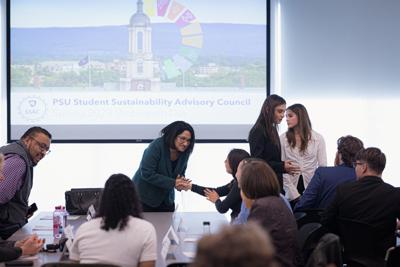Penn State’s Student Sustainability Advisory Council is composed of 23 active undergraduate and graduate students all dedicated to the vision of a greener future for the school.
A group of environmental advocates who often work behind the scenes, the SSAC informs university administration about how to best implement sustainable policy on campus.
The student-run council meets annually with Penn State President Neeli Bendapudi and other key decision-makers in the Sustainability Institute and the Board of Trustees.
As recently as this year, SSAC convinced Penn State to abandon the use of styrofoam takeout boxes in its dining commons in favor of more reusable containers.
One of its biggest responsibilities involves brainstorming how Penn State can achieve 100% reduction in emissions by 2035 as part of the school’s climate action plan.
Gabrielle Leach, a co-chair of SSAC, said she didn’t know much about sustainability until she joined the council.
Leach, a fourth-year studying environmental resource management, applied to SSAC because she wanted to find the “intersection between helping others and helping the environment.”
According to Leach, the experience of working with university stakeholders helped introduce her to a more holistic view of sustainability and its different aspects.
Leach works with co-chair Jacob Seiler to guide other council members through the process of proposal writing and presenting to senior leadership.
Seiler, a graduate student studying architectural engineering, said he believes sustainability can relate to every major or subject matter in some small way.
“I want to help spread the message that sustainability is for everybody,” Leach said. “It’s not just for engineers; it’s not just for environmental majors.”
SSAC member Ruby Chambers is currently writing a proposal to target greek life, which would affect the 17% of the student body who are involved by encouraging fraternities and sororities to create a dedicated sustainability chair.
“Our goal is to get knowledge across to people who aren’t thinking about it,” Chambers, a second-year studying geography, said.
In the future, Chambers said she wants to focus on student affairs on a larger scale because increasing attendance “is critical to spreading awareness and exposing more people to sustainability education.”
“It’s a privilege to represent the student body in this way because the platform that I have been given is so unique,” she said.
MORE CAMPUS COVERAGE
University Police have identified a male suspect who allegedly admitted to secretly recordin…
Chambers also said she’d like to see more students from other, non-STEM majors join SSAC because she said the council can benefit from a “diversity of perspectives.”
This year, Leach said the mission of SSAC is to “improve outreach and extension,” with the establishment of a new chair to help amplify student voices.
The council is currently broken into three, broad working groups: zero waste, carbon neutrality and sustainable education.
Leach said the overlap between groups represents the “very nature of sustainability” with each issue potentially inviting “a million different solutions.”
The council has recently branched out into providing education for extracurriculars around Penn State and collaborates with senior leadership at the university to carry out proposals, Seiler said.
As co-chairs of the SSAC, Leach and Seiler host biweekly council-wide meetings, which encourage members to “come together and discover overlap” while “helping one another through the process.”
Leach said she hopes more people at Penn State will take the initiative to reduce waste in whatever way that they can because the university will “never reach (its) goals unless every individual is doing their part.”
“There’s a lot that Penn State has done,” she said. “(But) there’s a lot that is still needed.”
Seiler said sustainability is something universities will always have room to improve upon.
“This isn’t a problem that disappears once we reach our benchmark,” he said. “Sustainability is being able to create something that can keep going.”
According to Leach, action happens when the student body can band together and demand sustainable efforts be pursued.
“Don’t feel discouraged or overwhelmed because you feel that your individual efforts won’t be enough,” Leach said. “They are — and I think we’re proof of that.”
MORE CAMPUS COVERAGE
Penn State THON hosted its annual THON 5K powered by PNC to begin its yearlong fundraising e…





